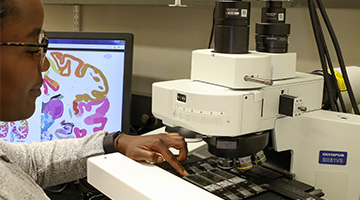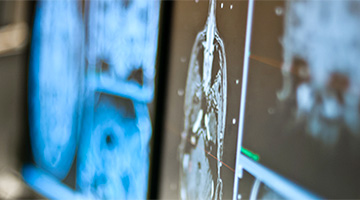Research
Our Research Focus
Biorepository
The Simpson Querrey Center for Neurogenetics Biorepository facilitates original discovery research of neurological conditions in support of the center's mission to understand the causes of these diseases and to identify candidate pathways for novel treatments. The biorepository is approved by the Northwestern University Institutional Review Board Office and recruits healthy control subjects in addition to patients with neurological disorders. We capture demographic and phenotypic data and store biological samples collected in our clinical practices. Northwestern University Feinberg School of Medicine investigators as well as external investigators are welcome to apply for access to these data and materials for investigator-initiated projects.
For more information on the biorepository, please contact us.
Genomic Characterization
The Center for Neurogenetics aims to identify the genetic risk factors that underpin neurological disease as a first step toward precision therapeutics and tailored treatments. To achieve this, we use modern sequencing technologies, including single nucleotide polymorphisms (SNP) genotyping, gene panels, exome and genome sequencing, as well as standard variant calling and interpretation pipelines to identify disease-associated variants. We also develop computational algorithms and frameworks to identify novel disease associations in both the coding and non-coding regions of the genome. We complement these studies with the design of high-throughput screens to discriminate between pathogenic and benign variants and identify modifiers of disease severity. Although this approach is performed at scale, our utmost focus is on the individual and the identification of the unique genetic signature in each patient that predisposes them to neurological disease.
Functional & Cellular Genomics
The organization of our program is predicated on the idea that a deep mechanistic understanding of disease pathogenesis for neurological disorders, applied to both basic and translational studies, can fuel the development of appropriate treatments for diverse populations of patients. Increasing ancestral diversity in both basic and translational studies is a critical first step in the process.
We have envisioned a stepwise strategy for developing biomarkers and then using them to design adaptive clinical trials capable of demonstrating target engagement in patients. The first step is to create biobanks from diverse populations of patients with neurological disease. In step two, these samples are analyzed using new technologies that facilitate identification of causal and risk variants as well as genes linked to these variants. Next, it is important to understand the functional effects of these variants in relevant cell types and tissues, followed by functional studies in human models of disease, such as pluripotent stem cell-derived neurons and glia. These studies generate large amounts of data, the integration of which requires sophisticated analytical approaches, including artificial intelligence and machine learning. These analyses are designed to identify validated targets and biomarkers that can improve stratification of patients, which can then be used in adaptive clinical trials to demonstrate target engagement. We have developed platforms that combine human genetic data, functional genomic tools and data mining technology to map novel connections between known genes and their influence on susceptibility, timing of onset and rate of disease progression.
Genetics Clinics
The Center for Neurogenetics operates dedicated clinics for in-depth clinical and genetic characterization of cases of neurological disorders known or suspected to be genetically determined, including movement disorders, epilepsy and neuromuscular disorders. These clinics are co-managed by expert neurologists with extensive knowledge of genetics and genetic counselors. The goal of these clinics is to perform detailed clinical characterizations of these patients to ensure that the most appropriate genetic testing is ordered, whether single-gene testing for pathogenic repeat expansions, disease-focused gene panels, whole exome or genome sequencing, microarrays for detected of copy number variants or an alternative procedure.
When a patient undergoes genetic testing, a genetic counselor provides support before and after the testing to confirm that the patient and their family understand the implications of the findings. Importantly, we systematically recruit patients and their family members in our biorepositories for further genetic characterization on a research basis with the goal of identifying novel genetic causes of disease for those cases that are not solved after genetic characterization with first-line testing.
Explore Our Work

Publications
Our contributions to the study of neurogenetics can be found in numerous high-impact journals.